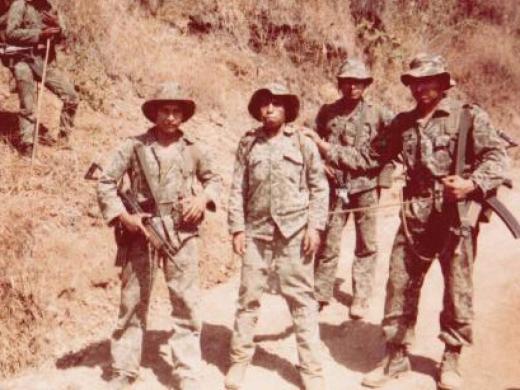Stories from the beginnings of the war in Iraq, and how it compares with wars in our country's past.
-
Download Control-click (or right-click) Tap and hold to download
- Subscribe on Spotify Subscribe in Apple Podcasts Subscribe
- Transcript

Bombs Over Baghdad
Act Two
Tice Ridley is a first lieutenant in the Army. He's been sending regular emails from Kuwait City, where he's stationed, about what it's like to wait for the war to begin, and what it's like to actually fight it. Excerpts are read by actor Tom Wright. (7 minutes)
Act Three
What's French for French Fries? David Sedaris has been following the diplomatic fiascoes of the last few months from Paris, where he lives. Relations between France and the U.S. have been so horrible these days we asked him how it seemed from over there. He sent us this dispatch. (4 minutes)
Fighting The Previous War
Sarah Vowell tells the story about the first time the United States attacked a country that hadn't attacked us first. It was also the first time the U.S. went to a foreign country to force a regime change. The country in question is still not doing too well a hundred years later. (8 minutes)
What Peacetime Forgets About Wartime
A few years back, a writer named Lee Sandlin wrote a story for the weekly paper The Chicago Reader about what makes wartime different—how a country's perceptions and logic during war are fundamentally different than during peace. It was a massive historical article, exhaustively researched. He was interested partly in World War Two—specifically, in why it'd been forgotten and what it was that had been forgotten. Actor Matt Malloy reads an excerpt. (10 minutes)
Lessons From Ancient Wars
The story of a preventive act of war committed 3200 years ago, in the land that's now Turkey, not too far from Iraq. Seneca's The Trojan Woman takes place at the end of the Trojan war. MacArthur Genius Grant recipient Mary Zimmerman is directing the play at the Goodman Theatre in Chicago. She talks with Ira about the play. In it, a child is murdered to prevent a war, though no one's really sure that if the child lived he'd have actually waged war on his neighbors. A superpower nation preaches about the child. "His life itself is a danger we cannot allow to continue to undermine the entire region's collective security." (5 minutes)



